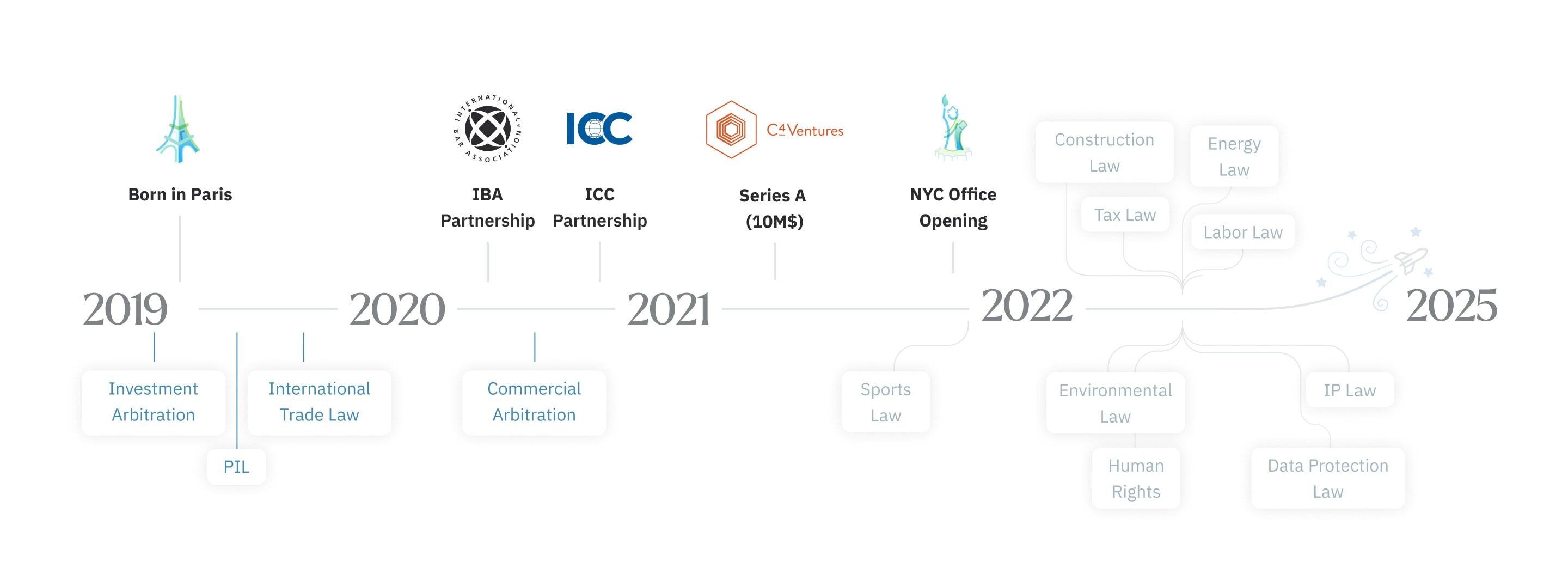Jean-Rémi de Maistre (Jus Mundi): "The level of access to legal information can make you win or lose the case"
1. What are the main benefits of using Jus Mundi?
Jus Mundi is a multilingual search engine for global legal information and people. We made it possible by combining the latest technologies, artificial intelligence, and legal expertise brought by former lawyers in our team.
We are changing the everyday lives of lawyers. On average lawyer spends 30% of the time on legal research. It’s even worse when you work on complex, cross-border cases. Resources (legal information and legal professionals) are scattered around the world. There was no single point of access to all the awards rendered by international arbitration tribunals or to a comprehensive directory of practitioners. Finding the right information to win a case is extremely complicated and costly. We made it all easy.
Today we span over four niche areas available on one platform: investment arbitration, commercial arbitration, international trade law, and public international law. Due to the lack of access in many branches of international law, we will keep growing into new domains, such as sports law, human rights, international tax law, environmental law, etc.
Jus Mundi has created unique tools for legal and arbitration research, analytics, alerts, and arbitration due diligence tools. We created Jus Mundi as we believe that building the rule of law is everyone’s responsibility. And our responsibility as legal tech is to democratize access to global legal resources to strengthen the global rule of law.
In Jus Mundi, we dare to prove every day that finding legal information around the globe can be easy, fast, and accurate!
Here’s what makes Jus Mundi so unique:
Open access: Access to all international and national arbitral awards worldwide, for free. Only premium tools require a subscription.
Multilingual search: Type query in English or French and get the relevant results in all the languages available. No more FOMO of international tribunal reasonings!
Directory: Find lawyers, arbitrators, States, law firms, experts with analytics for their specializations and backgrounds. Precisely, in any country.
Conflict Checker: Track past relations for arbitrators, tribunal secretaries, lawyers, law firms, States (experts soon) to avoid potential conflicts of interest!
Wiki notes: Learn about the key legal concepts under investment law and arbitration. Each note comes with a list of the latest pro and contra case laws. It is updated frequently!
Exclusive institutional partnerships: Thanks to our partnerships with the IBA, ICC, RAC, VIAC, the inaccessible awards are now accessible. Stay tuned for more partnerships.
2. Is artificial intelligence transforming the way we work in the legal sector?
Absolutely! There is much more information available now. It is like a huge flow and gigantic volume of data, which is not possible to deal with effectively without AI.
Artificial intelligence is revolutionizing the way how we access and process information!
We use AI for documents citation and pseudonymization. We do that to understand the legal information, understand and process the data, automatically identify legal concepts in any language thanks to our multilingual search engine, and search for the links to other legal documents and interconnect them.
You search for the information in any language, and our engine gives you all relevant results in all languages present. This way, lawyers are not constrained only to their language, but in this moment whole world gets unlocked for their research.
Now, with more cases available and AI technologies, it became possible not only to find a precedent closer to your case but also a concrete precedent for your case.
Then, in terms of legal professionals search, when you appoint an arbitrator, you can read an award drafted by this person. So it can help you to see what decision this arbitrator made in past, the way they think and argue. You will also be able to see the list of lawyers involved in the case, thus avoiding the conflict of interest.
3. Are Jus Mundi appropriate for all kinds of law firms (small, medium, or large)?
Oh yes. Accessibility should be for everyone! We work with all law firms irrespective of their size or location.
In just 2 years, more than 100 law firms have subscribed to our services. There are some big law firms in arbitration such as DLA Piper, Dentons, or Freshfields, as well as small & medium law firms from all over the world (e.g., Egorov Puginsky Afanasiev & Partners in Russia, Posse Herrera Ruiz in Colombia, Zhong Lun in China, Bredin Prat in France, or P&A Law in India).
Law firms of any size are genuinely concerned about bringing value to their clients by being more efficient. The feedback we are getting is super positive as everybody wants to be more productive, and they perfectly understand why it’s worth it. Of course, the process to bring in a new provider is heavy, and it takes time, but we always eventually get there.
In-house lawyers are also a big part of our clients, whether working in big corporates, such as Iberdrola, or governments like Chile or Japan. What they like is that Jus Mundi is super efficient in terms of saving the company's time and money as a consequence.

4. Is arbitration one of the branches of law that most relies on technology?
Technology in arbitration is crucial. If we look at all US and UE companies with a turnover of more than €100 million, 67% of them have at least one international arbitration in progress, and 40% have more than four. Because of the Covid19 crisis, the number of arbitrations is exploding, bringing a huge financial burden for the companies. So, arbitration needs and should rely on technology because the flow of information is huge, complex, multilingual, and produced by many different institutions.
The level of access to legal information can make you win or lose the case.
Before, it was impossible to find a precedent in commercial arbitration with only a few awards available online. Now everything has become possible! We have over 1,850 commercial awards.
The technologies we use in Jus Mundi are created to stop lawyers’ guesswork and help them make concrete, fact-based choices. Because if you have access to previous relevant cases and all detailed information on an arbitrator, you can make better strategic decisions. You know exactly what legal arguments to put on the table in court.
Even our institutional partners are benefitting from our technology as they can disseminate their data more efficiently.
Here’s our technology helps our partners:
ICC (International Chamber of Commerce) arbitral awards are published on Jus Mundi in an HTML format thanks to our partnership. All documents are anonymized and pseudonymized using technology.
Thanks to Jus Mundi, ICC can now better disseminate its information and improve access to its data with no need to invest in software. The awards are available to everyone through open access.
We have a partnership with the IBA’s Arbitration Committee partnership to collaborate with lawyers worldwide. The contributors send us awards from all around the world. In return, we give them visibility, and the whole arbitration community benefits from this collective effort and open access to contributions.
5. What are Jus Mundi's main challenges for 2021?
Jus Mundi’s mission is to democratize access to all legal resources, not only in arbitration. It means we have so much more information to collect and process to reach our goal.
We are focused on rapid growth - we plan to double the team, from 45 to 90, by mid-2022. We are hiring extensive data science (natural language processing experts) and tech teams, mainly investing in the product.
40 % of our clients are from the US. We are also opening a new office in New York and building a team of top-notch US business developers! We’ll be rapidly expanding in the corporate market as we see a massive demand for our solutions.
There is so much to be done, and we are just getting started! We are preparing to cover all the domains of international law in the coming five years!
Related links
Main menu






